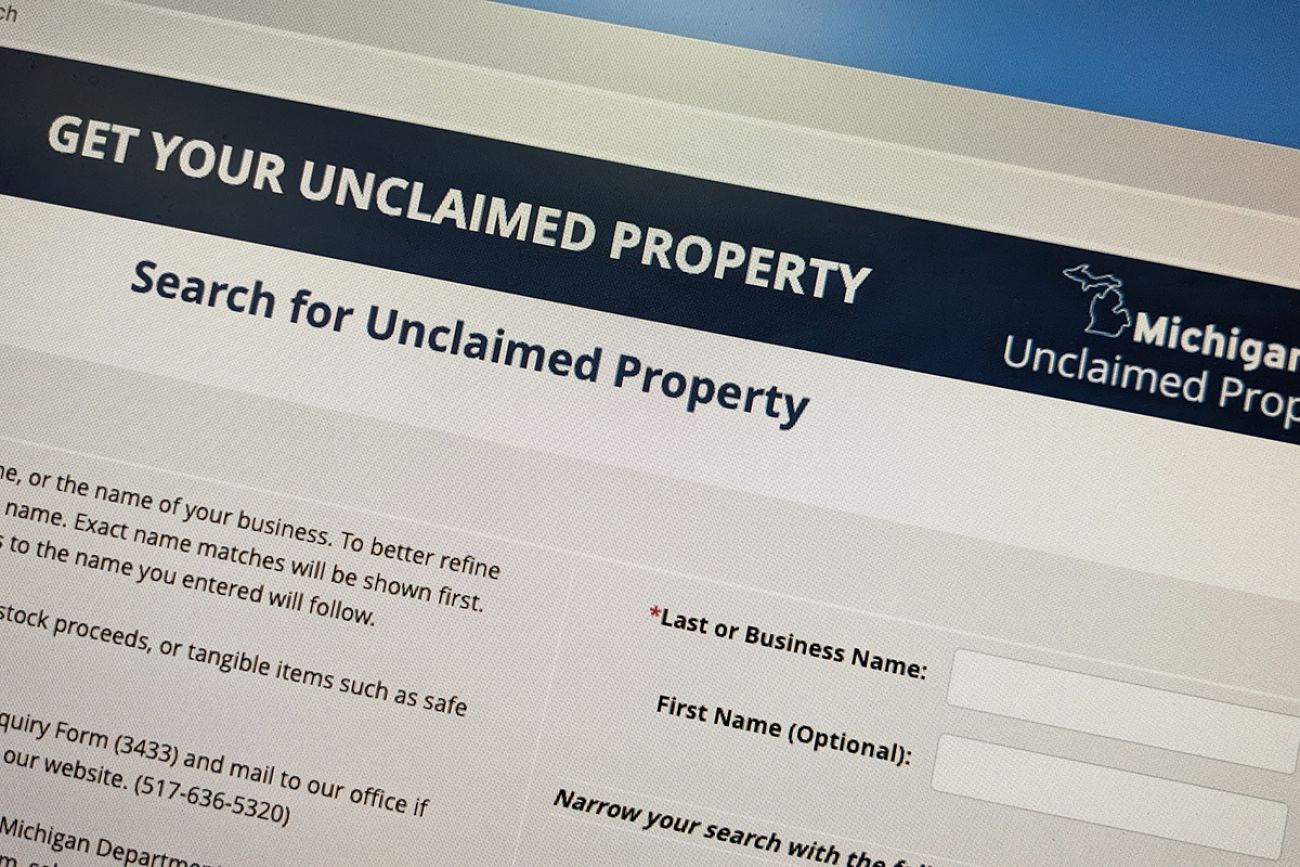How Michigan makes $122M per year keeping unclaimed, missing money from residents

- Michigan keeps— and spends— about $122 million in 'abandoned' property each year
- Owners can claim the money and submit documentation online, but properties under $50 are not listed
- Critics say the state should automatically cut checks and more
LANSING — Your loss is the state government’s gain under Michigan's unclaimed property program, which collects hundreds of millions of dollars each year in lost or abandoned property and returns less than half to its rightful owners.
It might be a check that you never cashed, a bank account you forgot about, a safe deposit box you unknowingly inherited or an electric utility deposit you never collected before moving to a new home.
While the state Treasury proudly declares that it has returned more than $500 million to owners in the past five years, a Bridge Michigan analysis found the government is pocketing more than half the money it collects: $611 million over that span.
The state has improved return rates in recent years by implementing an online system that allows potential owners to both find and claim lost property by submitting copies of documents like a driver license and Social Security card.
But critics contend Michigan officials have little motivation to pursue more aggressive reforms made in other states — including automatic repayment when an owner is easily identifiable —because the state spends money not claimed.
In fact, Michigan uses unclaimed money to help balance its budget, lawmakers acknowledge. Most of it, worth an average of $122 million annually, ends up in the state’s general fund, which lawmakers use for discretionary spending, including more than $2 billion in pork projects over the past two years.
That profit “creates a disincentive” for the state “to do a good job of returning money," said Ron Lizzi, an unclaimed property watchdog who has helped spur reforms in Connecticut and Colorado.
The Michigan program “needs to be scrutinized,” Lizzi said. “People need to say, ‘Why aren't you doing better than that? How much of this money is returnable?’”
A $2 billion database
Every year, companies, banks and other entities across Michigan turn over hundreds of millions of dollars worth of abandoned property to the state, as legally required each July.
The Michigan Treasury lists any property worth $50 or on a website online, so potential owners can claim it as their own. But many people don’t know about the website, which has ballooned to include more than 8.6 million unclaimed properties worth a collective $2 billion, according to Treasury data.
You might be on the list.
How to get paid by the state for "unclaimed property"
If you lost a check, forgot about a bank account or otherwise abandoned property, it should eventually end up with the state, where you have another chance to claim it.
1. Go to unclaimed property.michigan.gov
2. Hit "get started" and search to see if the state lists any properties under your name
3. If so, fill out online form to start a claim
4. The state will email you a PDF. Sign the affidavit and prepare copies of other requested identifying documentation, such as your driver's license or social security card
5. Go to this website to upload your PDF claim and identifying documents
6. Wait for the state to process your claim and, if successful, send you a check or instructions on how to obtain other property
Note: The state does not list unclaimed properties worth less than $50 on its website. Instead, you can call 517-636-5320 to find out if you are owed any smaller-value properties.
Related:
- Michigan reaping millions by ‘hiding’ unclaimed money worth less than $50
- No criminal charge? No problem! Michigan police can still take your car
Michigan Lt. Gov. Garlin Gilchrist is. So is Attorney General Dana Nessel and her wife. Gov. Gretchen Whitmer’s brother too.
They each appear to own property worth “over $250” — and possibly much more — that they could claim at any time but have not yet done.
The Michigan Treasury collected nearly $1.2 billion in unclaimed property over the past five years, including $296 million in fiscal year 2022, when the state returned $137 million to owners.
That was up from 2021, when the state collected $269 million and returned $117 million.
Lizzi and other experts have identified several shortcomings they contend are limiting Michigan claims:
- The state’s website does not list any properties worth less than $50, effectively concealing from public view a collective $190 million that owners have no way of knowing about aside from blindly calling the Michigan Treasury to find out.
- The state does not list the exact value of properties on its public website. The highest-value category is “over $250.” That could mean $251 or much more, and owners are much more likely to pursue the latter.
- Unlike a growing number of states, Michigan has no process for automatically returning money in cases where ownership is clear.
Money match
Michigan has returned record amounts of money or other unclaimed property to owners over the past two years, including nearly $137 million in fiscal year 2022, an increase officials attribute to a “state-of-the-art” online database launched in 2018.
The process once was more cumbersome: Claimants found names online but then had to print and mail in a request form, which staffers would review and then send out a separate paper claim form, which a claimant would need to return by mail with ownership-verifying documentation.
Now, that can all be done online, which “has not only sped up the claims process for potential property owners, but … also significantly increased the numbers of claims we receive annually,” said Terry Stanton, the state administrative manager for the Michigan Treasury’s unclaimed property program.
To boost awareness about unclaimed properties, Treasury advertises twice a year in a statewide newspaper and sends staff to conferences or seminars to show people the online system, he said.
The state also runs a customer call center to field questions and runs a “data match” program that uses tax data to contact potential owners at what “we can reasonably believe is their most recent mailing address,” Stanton told Bridge, noting four staffers spend “more than half their annual hours” on outreach.
Despite those efforts, Michigan’s 48 percent return rate over the past half decade is far behind state leaders such as Wisconsin, which in 2020 returned more than 68 percent of the money it collected that year.
Officials in Wisconsin credit their automatic return program, which began in 2015. If tax records can help the state identify a clear owner, the state won’t just try to contact them; it will automatically mail out checks for properties worth less than $2,000.
A small but growing number of states have similar programs, including Utah, where Gov. Spencer Cox this year signed legislation allowing for automatic returns in cases where tax data reveals clear ownership and addresses.
Delaware launched a "money match" program in 2021 and mailed more than 25,500 checks that year. Illinois just launched its own automatic repayment program and is expected to send out 66,700 checks this year. Connecticut did the same and this week announced record returns.
Michigan doesn’t automatically return money because it is part of the state’s “fiduciary responsibility” to require potential owners to file a claim and provide documentation before any payments are made, Stanton said.
But because the Michigan Treasury oversees both tax collections and the unclaimed property program, the state is well-positioned to automatically return money should lawmakers seek to force a change, Lizzi told Bridge.
"If you're not automatically returning money, you're not really trying," he said. "I call those states deadbeat states. Michigan qualifies as a deadbeat state.”
Cities, schools owed money
It’s not just residents who are owed money and could benefit from automatic payments.
More than 100 local governments and school districts in Michigan have money or other unclaimed property worth “over $250” — and possibly much more — that they could recoup from the state, according to a Bridge review.
That’s money that could be used to buy textbooks in schools from Ann Arbor to Zeeland or pave streets in communities from Birmingham to Wyandotte.
"We're not very hard to find," said Southfield Treasurer Irv Lowenberg, who told Bridge he was unaware his city had more than 60 properties listed on the state website before a reporter contacted him.
More than two dozen of the Southfield properties are worth more than $250, handed over to the state by companies including Walgreens, Beaumont Health System, Family Dollar Stores, PayPal, Manpower and AOL.
Stanton said the state has “historically done outreach to school districts and local governments” with unclaimed property, but Lowenberg told Bridge he was unaware of any contact about the Southfield properties in the online database.
"It wouldn’t take much effort because we deal with (the Michigan Treasury) on a continuous basis,” he said, noting that “if there are funds out there that are available to us, we will make every effort to get them.”
Some states have done more to help local governments recoup funds. California in 2019 adopted a law to automatically return unclaimed property to local and state agencies, including cities and universities.
Many high-profile nonprofits appear to own unclaimed property too: The United Way — including various national, state and local chapters — has 150 properties listed on the state’s website. The American Cancer Society has 17. The Kresge Foundation has four.
‘Helps balance the books’
Instead of pursuing automatic repayments or other major policy reforms here, Michigan lawmakers have more often used unclaimed property proceeds to boost spending or plug budget holes.
As part of a 2010 budget deal that aimed to avert an unconstitutional deficit, then-Gov. Jennifer Granholm and legislative leaders agreed to shorten the window for property to be considered "abandoned," creating a uniform three-year period that resulted in a one-time $168 million revenue "infusion" for the state.
“We've got a tremendous amount of unclaimed property in the state and… obviously we've got a disconnect between people being able to properly locate it,” said state Sen. Michael Webber, a Rochester Hills Republican.
“It just helps balance the books, unfortunately.”
Webber in 2020 co-sponsored bipartisan legislation that would have given private companies more and less expensive access to the state's unclaimed properties list, so they could attempt to work with owners to file claims on their behalf for profit.
Then-Rep. Wendell Byrd, a Detroit Democrat who worked with Webber on the legislation, said so-called locator or finder companies could help residents file claims by completing some of the "busywork" for them.
“A lot of people don't know the money is there, or they don't have the expertise to go get the money," Byrd, who was termed out of the Legislature at the end of 2020, told Bridge.
"If you're an 88-year-old lady in a nursing home, you're not going to go to a website," he said.
The legislation passed the House and Senate but was vetoed by Whitmer, who said the proposal would "not only put an increased administrative burden on the Department of Treasury, but do so at the expense of consumer privacy."
Locator firms can keep up to 40 percent of the claim they recover for owners, according to an analysis by the non-partisan House Fiscal Agency. But the Department of Treasury, Whitmer said, "already does an excellent job returning lost and unclaimed property to its rightful owners, at no cost to Michiganders."
The veto was not a surprise, but the privacy concerns seemed like an “excuse” to stop a heavy lift Treasury simply did not want to undertake, Webber told Bridge.
“I think the department is just kind of rigid,” he said. “If you have to offer more transparency in the process, you're probably going to need a few more workers and more staff. And I just think they aren’t quite willing to do that work.”
What does ‘over $250’ mean?
Officials in Michigan and across the country have cited privacy concerns while warning of unclaimed property scams and fraud.
But that potential has been "exaggerated" as justification for limiting public facing data that would help owners recover their property, argued Randy Hotz, who runs a Washington-based locator firm and has studied state-level policies as part of the Unclaimed Property Professionals Organization.
Michigan’s public database does not list owner addresses and provides only minimal information about the unclaimed property in question, which experts say could discourage legitimate owners from filing recovery claims.
"They are preventing fraudulent claims by tightening up the information that is available, but they're doing about a thousand times more harm by preventing people from being able to determine, ‘Is that my money,’” Hotz said.
One simple fix that Hotz suggested: Disclose the exact amount an unclaimed property is worth instead of simply saying it is worth "over $250," which is the highest value category that Michigan lists on its public website.
"How much time are you going to spend on $250? You might spend some time, but a lot of people won't spend much,” Hotz said.
The Michigan Treasury could make that change on its own but hasn’t, which Stanton called an “administrative decision made to combat fraud.”
Other states provide more data on their public websites for unclaimed property. California, Texas and Hawaii each include an owner’s last known address and will tell you if a property is worth $2,208.75 or just 75 cents, for instance.
Nationally, state-run unclaimed property programs take in roughly $8 billion dollars a year and pay out roughly three billion, Hotz said. That's a 38 percent return rate, far shy of the 70 percent that experts believe is possible.
"Because they get to use the money while it remains unclaimed, states have an incentive to do good, but not necessarily as good as they could do," Hotz said.
See what new members are saying about why they donated to Bridge Michigan:
- “In order for this information to be accurate and unbiased it must be underwritten by its readers, not by special interests.” - Larry S.
- “Not many other media sources report on the topics Bridge does.” - Susan B.
- “Your journalism is outstanding and rare these days.” - Mark S.
If you want to ensure the future of nonpartisan, nonprofit Michigan journalism, please become a member today. You, too, will be asked why you donated and maybe we'll feature your quote next time!




